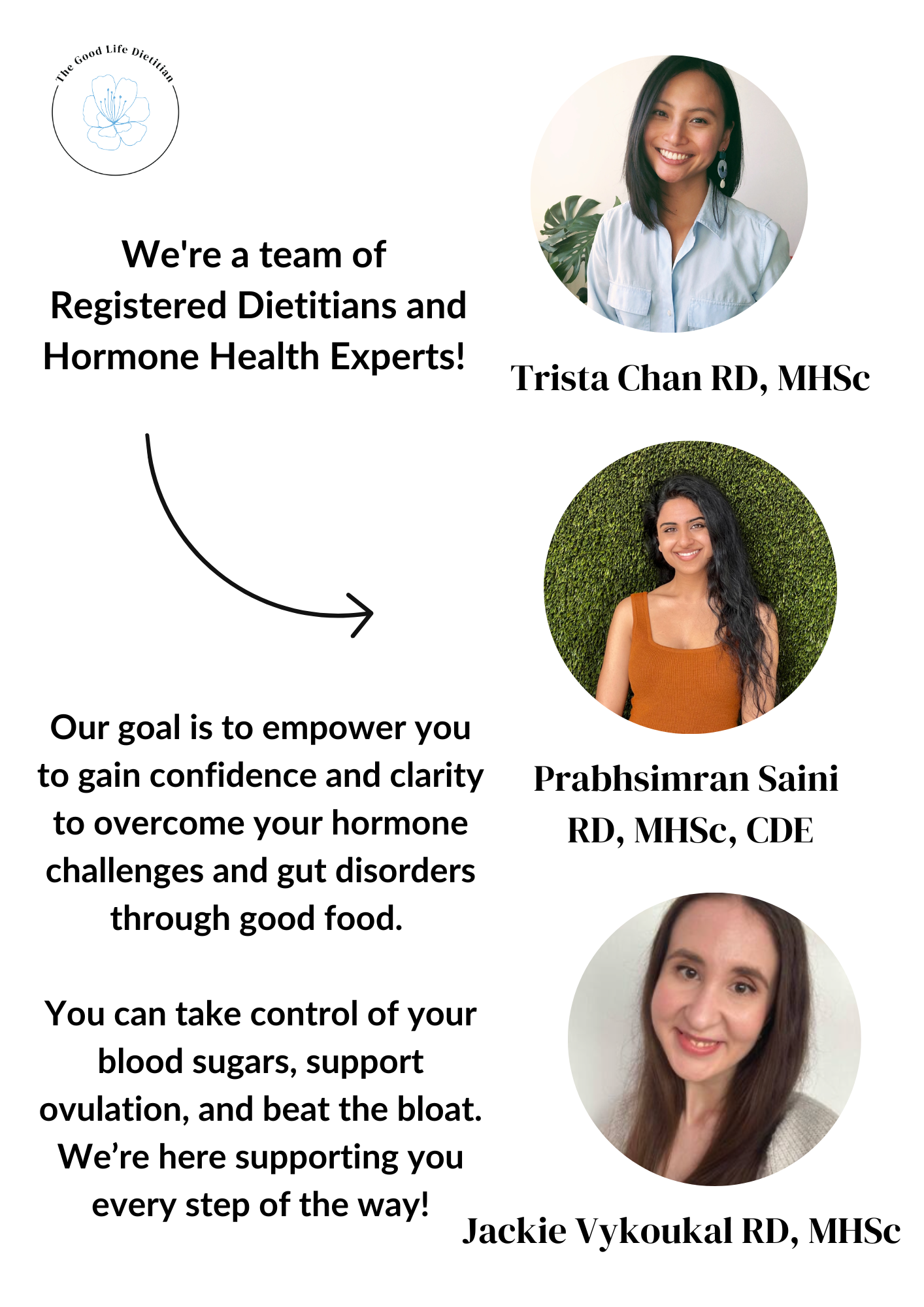Tuning In, Not Tuning Out: How Mindful Eating Can Support PCOS + Gut Health
You wake up with the best intentions. Maybe today you’ll “be good” around food. You power through the morning with coffee and a salad-for-lunch mindset, but by 3 p.m., a cookie is all you can think about. . The rest of the day feels like a blur of grazing, guilt, and promises to “start fresh tomorrow.”
If that sounds familiar, you’re not alone! Many of us are caught in the exhausting cycle of restriction, insatiable cravings and guilt especially if we live with PCOS or digestive issues that make food choices feel more complicated.
The good news? There’s a gentler, more effective way to nourish your body without falling into the all-or-nothing trap. One option (of many) is mindful eating. It’s a practice that can help you feel more connected to your body’s cues and bring more presence.
It’s not always accessible or the right fit for everyone (for example, if you’re managing medical conditions, sensory sensitivities, or eating disorders. But for some, it can be a useful tool to rebuild trust with food and support both PCOS and gut health.
What Is Mindful Eating?
At its core, mindful eating is about eating with intention and paying attention. Checking in to notice what you’re eating, how it tastes, and how it makes you feel.
It’s not a diet, it’s not a strict program, and there’s no way you can fail at this. It doesn’t require perfection. Instead, mindful eating is a practice of curiosity.
When you practice mindful eating (in conjunction with structured eating), you may begin to:
Connect to your body’s cues. Enjoy food with less judgment or guilt
Improve digestion through slower, more present eating
Build a more trusting relationship with your body
It’s a process, not a quick fix, but one that can completely change the way you approach food.
How Diet Culture Complicates Our Relationship with Food
The global diet industry is worth a looooot of money, and its messages are everywhere.
On one hand, we’re told that “clean eating” is a moral virtue that our worth is tied to our willpower. On the other hand, we’re flooded with marketing for ultra-processed convenience foods. This constant contradiction leaves us questioning:
How healthy is healthy enough? When does convenience cross the line into disconnection? When does “wellness” become another source of stress?
These mixed messages can erode our trust in our own bodies, creating guilt around food and leading to an unhealthy cycle of restriction and compulsive eating.
Mindful eating offers a way out not by ignoring nutrition, but by reclaiming presence, autonomy and self-compassion in the way we eat.
Why Mindful Eating Matters for PCOS and Gut Health
For those living with PCOS or digestive symptoms like bloating and reflux, mindful eating can be especially powerful.
Eating while on auto-pilot, often at a very quick pace or under stress, keeps your body in “fight or flight” mode, making digestion harder.. By slowing down and tuning in, you can activate the parasympathetic nervous system also known as the rest and digest mode which allows your body to process food more efficiently and reduce discomfort.
Mindful eating can also help regulate blood sugar, a key factor in PCOS management. When you eat slowly, you give your body time to recognize fullness and avoid the spikes and crashes that often trigger cravings or fatigue later in the day.
4 Steps to Start Eating Mindfully
You don’t need to overhaul your entire life to begin. Start with small, sustainable changes that fit your lifestyle. Here are four approachable ways to begin:
Stay Nourished Throughout the Day
Mindful eating only works when your body isn’t in a starvation state. If you skip meals or go too long without eating, cravings will naturally take over, and no amount of mindfulness can override true hunger. (The goal is never to eat less, anyway).
Structured eating and consistent nourishment are the foundation. Aim for balanced meals and snacks that support energy, focus, and overall well-being.
Working 1-on-1 in our nutrition programs can help you nail down what “staying nourished” looks like for you.
2. Slow Down and Ask Yourself Key Questions
Before diving in, pause for a few seconds. Ask yourself:
Why am I eating right now: hunger, comfort, boredom, or habit?
How does this food smell, look, and taste?
Am I eating quickly, or taking time to enjoy it?
Would something balanced, like yogurt and fruit, or eggs and toast, sound good right now, or am I only craving sweets or salty?
There’s no right or wrong answer here, it's about bringing awareness to the moment instead of eating on autopilot.
And by the way, we’re human (not robots), so we don’t only eat for function. If you answered “comfort” or “Habit” or “boredom” as a response to wanting to eat a sweet, that’s okay! The takeaway here is that you made an informed choice.
3. Adjust Your Environment
You don’t have to eat in silence for it to “count” as mindful. Some people do best with background noise or movement, while others thrive in a quiet, distraction-free space. The key is intention: notice what kind of environment helps you actually tune in to your meal instead of zoning out.
4. Notice Mental and Bodily Cues Check in With Your Cues
Start by noticing your hunger, your body’s “I need fuel” signals. If hunger doesn’t feel like a stomach growling, that’s okay. Other signs can include low energy, trouble focusing, sudden mood changes, feeling jittery or confused, or even stomach discomfort.
As you eat, check in with fullness. Notice not just abdominal stretching, but also signals like reflux, nausea, a sudden” food ick”, or general discomfort. Paying attention to these cues helps you eat in a way that actually supports your body, rather than just following the clock or external rules.
The Bigger Picture
Mindful eating isn’t about perfection - it’s about presence. It’s one tool to help you tune back into your body, honour your hunger, and reduce guilt around food. Over time, it can support digestion, ease stress and bring a bit more calm to the way you eat.
If you live with hormonal or digestive disorders and find yourself stuck in the binge-restrict cycle, mindful eating can be one of many helpful tools. Eating won’t always feel “good,” and sometimes it’s frustrating, but practicing mindful eating anyway helps you stay connected to your body and your experience of food in a neutral, accepting way.
Hi! I’m Trista
A Registered Dietitian and reproductive health expert. I’m here to help you gain confidence to overcome your Polycystic Ovary Syndrome and digestive health woes, while bettering your relationship with food.
CATEGORIES
Ready for Support?
If you’re craving a calmer, more sustainable approach to nutrition, our dietitians’ 1-on-1 nutrition programs can help you personalize gentle nutrition, stabilize energy and digestion, and build habits that last - no rigid rules required.













